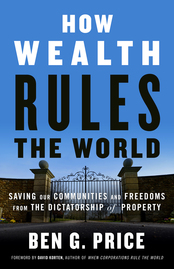The Community Environmental Legal Defense Fund (CELDF) is making available a serialization of Ben Price’s book. Read this award-winning book in free installments of downloadable PDF files shared below and join Ben Price for periodic webinars to discuss the book in the sequence of shared chapters.
“HOW WEALTH RULES THE WORLD
by Ben G. Price
Saving Our Communities and Freedoms
from the Dictatorship of Property”
Crackdowns on local democracy are accelerating, as corporate and state interests continue efforts to repress social movements. In this well-timed book, Ben Price presciently reveals structures of power and law that facilitate blatant corporate supremacy in the United States. Price uses his years of experience as a community organizer and a careful reading of history to show how a legal paradigm that facilitated slavery and the fossil fuel economy has endured and adapted over time – today barricading our communities and squelching dissent.
Many books have been written about wealth, power and politics in the United States. Most of them make intuitive sense. Wealthy people use their power to influence and control politics. But Ben Price’s new book is often counterintuitive as he explores how wealth itself is imbued with power. He answers questions such as:
How is the American Legislative Exchange Council – a modern states’ rights, free market capitalist group – the intellectual and political descendant of George Washington’s Federalist Party?
How was the Fourteenth Amendment that emancipated African American slaves from their status as property used by a reactionary Supreme Court to grant legal “personhood” to private corporations?
How are cities seen under our legal doctrine as “public corporations,” devoid of real governing authority?
Further, Price identifies key counterrevolutions in U.S. history that squelched the transformative potential of the Civil War and American Revolution, and traces the roots of colonial and imperial systems of control. He links them to modern “free trade” agreements and other antidemocratic structures used to supersede democracy to this day.
For some, this will come as no surprise. For others, it will be a rude, though necessary, awakening. “The white man’s municipalities are just reservations, like ours,” said a resident of Pine Ridge Reservation, whom Price spoke with. “The difference is, we know we live on reservations. The white man doesn’t.”
Crucially, Price shares insight into how social movements can plant seeds of a new legal system that makes the liberty, civil rights and dignity of humans and ecosystems its ultimate purpose. In fact, he introduces the reader to people who are doing just that.

The lively and engaging webinar discussions on Ben Price’s award-winning book, How Wealth Rules the World: Saving Our Communities and Freedoms from the Dictatorship of Property, has concluded. We are already planning our next webinar series. Stay tuned!
You can watch the recordings below or on the CELDF YouTube channel!
Be sure to LIKE and SUBSCRIBE to get all our recent content :)
“In this book you can discover what intrepid communities across the country have learned and why they’ve taken up the community rights strategy. The Federalists who wrote the US Constitution were counterrevolutionaries. . . They vested greater rights in property than in people and put us on the disastrous route to environmental devastation and social chaos. Correcting the counterrevolutionary agenda that allows wealth to govern our lives instead of democratically assembled communities of people will require a full-blown people’s movement. [Here is] your invitation to join that fight.”
– Thom Hartmann, author and broadcast journalist
“Read How Wealth Rules. . . share it, discuss it, and organize around it as if your family’s and friends’ lives depended on it—because they do.”
– John Stauber, author of bestsellers including Toxic Sludge Is Good for You; Trust Us, We’re Experts; and Weapons of Mass Deception
If you’d like a print copy of the entire book

Purchase a copy of How Wealth Rules the World: Saving Our Communities and Freedoms from the Dictatorship of Property, by CELDF’s Ben G. Price from publisher Berrett-Koehler here: BK Bookstore | Shop Books for Businesses and Company Events (bkconnection.com)
Or from your favorite book supplier

HOW WEALTH RULES
PART ONE
One Right to Rule Them All
The Dark Side of Property
Ben G. Price
“When plunder becomes a way of life for a group of men living together in society, they create for themselves in the course of time, a legal system that authorizes it and a moral code that glorifies it.” — Frederic Bastiat
HOW WEALTH RULES
PART TWO
Property is Not an Unalienable Right
Ben G. Price
“I doubt whether a single fact, known to the world, will carry as clear conviction to it. . . of the treasonable views of the federal party. . . who having nothing in them of the feelings or principles of ’76 now look to a single and splendid government of an Aristocracy, founded on banking institutions and monied in corporations. . . This will be to them a next best blessing to the Monarchy of their first aim, and perhaps the surest steppingstone to it.” — Thomas Jefferson
HOW WEALTH RULES
PART THREE
The Ongoing Counter-Revolution
Ben G. Price
“The uniformity of the Framers’ economic status had a predictable impact on the Constitution. It provides protections for property rights and limits the political powers of the poor. In contrast, it does not provide for the needs of the lower classes. Instead, those provisions focused on the poor are designed to suppress insurrections, to prohibit state debtor relief laws, and to prevent property redistributions.” — Ann M. Burkhart
HOW WEALTH RULES
PART FOUR
Of laws and Men
Ben G. Price
“Property and sovereignty, as every student knows, belong to entirely different branches of the
law. Sovereignty is a concept of political or public law and property belongs to civil or private
law. This distinction between public and private law is a fixed feature of our law-school
curriculum. It was expressed with characteristic eighteenth-century neatness and clarity by
Montesquieu, when he said that by political laws we acquire liberty and by civil law property,
and that we must not apply the principles of one to the other.” — Morris R. Cohen
HOW WEALTH RULES
PART FIVE
The Emancipation of Property from Democracy
Ben G. Price
“…Out of this modern civilization, economic royalists [have] carved new dynasties…. The
royalists of the economic order have conceded that political freedom was the business of the
Government, but they have maintained that economic slavery was nobody’s business. It was
natural and perhaps human that the privileged princes of these new economic dynasties,
thirsting for power, reached out for control over government itself. They created a new
despotism and wrapped it in the robes of legal sanction…. And as a result, the average man once
more confronts the problem that faced the Minute Man…” — Franklin D. Roosevelt
HOW WEALTH RULES
PART SIX
The Municipal Colonies of America
Ben G. Price
“Let the National Government be entrusted with the defense of the nation and its foreign and
federal relations; the State governments with the civil rights, laws, police and administration of
what concerns the State generally; the counties with the local concerns of the counties, and each
ward direct the interests within itself. . . It is by dividing and subdividing these republics from the
great national one down through all its subordinations, until it ends in the administration of
every man’s farm by himself; by placing under everyone what his own eye may superintend, that
all will be done for the best.” — Thomas Jefferson
HOW WEALTH RULES
PART SEVEN
The New Three-Fifths Clause
Ben G. Price
“Civil government, so far as it is instituted for the security of property, is in reality instituted for the defence of the rich against the poor, or of those who have some property against those who have none at all.” — Adam Smith
HOW WEALTH RULES
PART EIGHT
The Pretense of Representation
Ben G. Price
“To the shock and dismay of land-based elites, the workers who poured into the cities between
1870 and 1920 challenged elite rule through Democratic Party machines and the Socialist Party.
So the growth elites created a ‘good government’ ideology and a set of ‘reforms’ that literally
changed the nature of local governments and took them out of the reach of the upstarts.” — William G. Domhoff
HOW WEALTH RULES
PART NINE
Creditors and Cannibals
Ben G. Price
“Poverty is that state and condition in society where the individual has no surplus labour
in store, or, in other words, no property or means of subsistence but what is derived from the
constant exercise of industry in the various occupations of life. Poverty is therefore a most
necessary and indispensable ingredient in society, without which nations and communities could
not exist in a state of civilization. It is the lot of man. It is the source of wealth, since without
poverty, there could be no labour; there could be no riches, no refinement, no comfort, and no
benefit to those who may be possessed of wealth.” — Patrick Colquhoun
HOW WEALTH RULES
PART TEN
Property’s International Empire
Ben G. Price
“Under capitalism, man exploits man. Under communism, it’s just the opposite.” – John
Kenneth Galbraith
HOW WEALTH RULES
CONCLUSION
Conclusion
Ben G. Price
“. . . we could survive and even maintain a decent or better existence into another and future
centuries. It would take massive and combined, dialectically inseparable transformations in our
relationships with each other and with Nature, of which we are of course part. But it could
happen. I don’t think rich people and their culture of wealth, avarice, profit, consumption, and
class rule can be sustained under the deep changes required. They will have to give up their
wealth and power one way or another.” — Noam Chomsky
